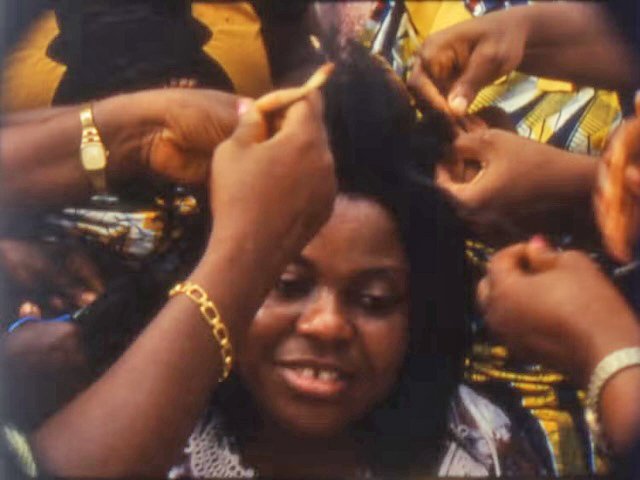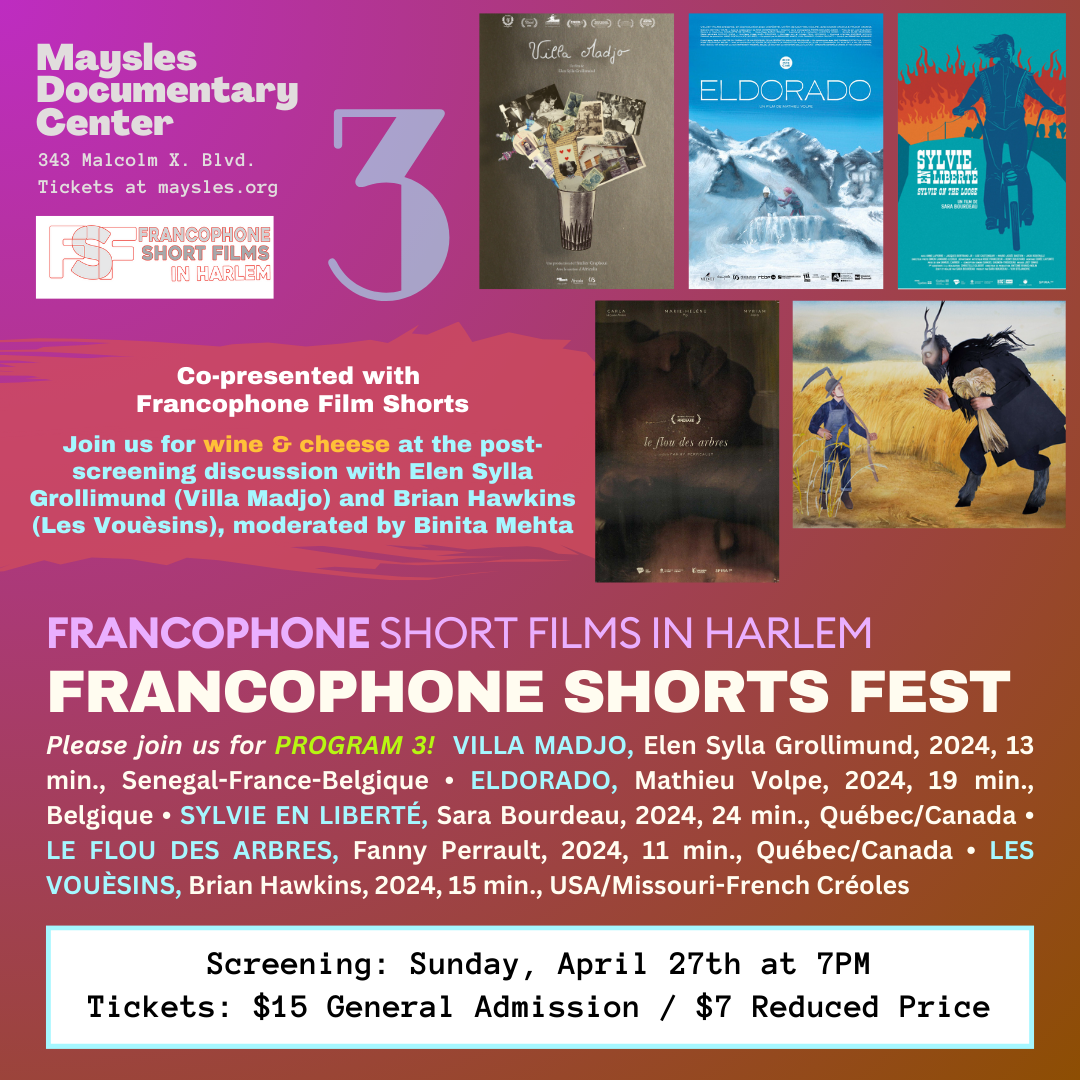monica freeman, ca 1977 • Photo: john wise
feminist elsewheres
April 19-20, 2025
Two-day film and conversation program, Maysles Documentary Center
Queer-feminist film work is collective, transnational, and complicated. The networks that emerge from it are expansive, ephemeral, and in need of care. With this program feminist elsewheres is looking for connections between historical and contemporary feminist film, tracing the stories, times, and border-crossing lineages of its existence.
From the Black feminist film scene in the US and film gatherings in Europe in the 1970s to poetic negotiations of borders and memories between Nigeria, Thailand, and Germany, this program is an unfinished search for the significance of queer-feminist film.
The event opens with a selection of films based on the feminist elsewheres research on the 1973 First International Women’s Film Seminar, Berlin. Other programs will include the complete works of Monica Freeman, contemporary films by Arisa Purkpong & Jana Buch as well as the German Television production The Snake in My Bed by LA Rebellion director Omah Diegu.
PROGRAM
SATURDAY, APRIL 19TH – 5:00 PM
• WHAT COULD HAVE BEEN
All Women Are Equal
Marguerite Paris, US 1972, 15’
I Am Somebody
Madeline Anderson, US 1970, 28’
Introduction by feminist elsewheres
In 2023, 50 years after the Berlin First International Women’s Film Seminar, we opened our feminist elsewheres festival with a film that screened at the event in 1973 – and another film that could have been shown based on its year of production. In 2025, the urgency to curate these titles remains. The program reflects on the absences, exclusions, and losses in the histories of feminist film.
All Women Are Equal is a unique portrait of a white trans woman reporting on her everyday life in Nottingham, England, and the inherent difficulty of openly living out her gender identity. The asynchronous relationship of sound and image contributes to the deconstruction of female subjectivity, equally emphasizing narrative and gesture. The collective perspective announced by the title corresponds with today’s claim for gender justice.
I Am Somebody takes us back to the civil rights movement in the United States. Madeline Anderson follows the successful strike of hospital workers in Charleston, South Carolina, demanding higher wages and the right to join the local union. Among others, civil rights activist Coretta Scott King (wife of Martin Luther King Jr.) speaks out in support of the labor struggle led by predominantly Black women. Out of this collective concern emerges the strength of subjective self-assertion.
$15 General Admission / $7 Reduced Price
$40 / ALL EVENTS on BOTH DAYS
SATURDAY, APRIL 19TH – 6:30 PM
• OPENING RECEPTION
SATURDAY, APRIL 19TH – 8:00 PM
• CELEBRATING MONICA FREEMAN and FRIENDS
Just Briefly
Louise Fleming, US 1975, 19 min.
Valerie: A Woman, An Artist, A Philosophy of Life
Monica Freeman, US 1975, 15 min.
A Sense of Pride: Hamilton Heights
Monica Freeman, US 1977, 15 min.
The Children’s Art Carnival: Learning Through the Arts
Monica Freeman, US 1978, 17 min.
Hair Piece: A Film for Nappy Headed People
Ayoka Chenzira, US 1984, 10 min.
Panel conversation with Monica Freeman, Christine Choy, Louise Fleming, and Jennifer Lawson
Moderation by Hayley O’Malley
This program celebrates Monica Freeman’s work that spans over four decades in filmmaking, programming, and teaching Black feminist film history. Freeman’s Valerie: A Woman, An Artist, A Philosophy of Life (1975) explores the practice of the sculptor Valerie Maynard who she met in the flourishing Black arts context of the Studio Museum in Harlem. 1977 she made A Sense of Pride: Hamilton Heights with an all-female crew on local biographies and the history of Hamilton Heights. She produced and directed her last short Children’s Art Carnival: Learning Through the Arts in 1978, a documentary on the Hamilton Heights based youth art education center. The films were widely seen in their time, playing at countless international venues, such as FESPACO, and helped pave the way for other Black feminist filmmakers. The program is framed by Louise Fleming’s Just Briefly (1975) that Freeman curated as part of the 1976 Sojourner Truth Festival of the Arts in New York City and Hair Piece: A Film for Nappy Headed People (1984) directed by Ayoka Chenzira who previously worked on Monica’s films.
$15 General Admission / $7 Reduced Price
Includes Opening Reception
$40 / ALL EVENTS on BOTH DAYS
SUNDAY, APRIL 20TH – 3:00 PM
• FRAGMENTS OF MEMORY / WORKS BY ARISA PURKPONG
Work In Progress
Arisa Purkpong, NO 2025, 3 min., digital file, b/w
Notes of Stone
Jana Buch & Arisa Purkpong, DE 2020, 9 min., digital file, color
Concept and Images: Jana Buch & Arisa Purkpong
Music: Tim Löhde
Voice: Elena Packhäuser
Copyediting: Sarah Herndon & Lóa A. Kristínardóttir
Untitled
Arisa Purkpong, DE 2022, 49 min., digital file, color
Transcriptions and translations: Jana Buch, Sikarnt Skoolisariyaporn
Audio mixing: Vandy Roc
Music: Tim Löhde
Drawing (short mackerel): Suhpamid Purkpong
Arisa Purkpong in conversation with feminist elsewheres
Currently based in Oslo, artist Arisa Purkpong works with film collages, photography, installation, and publications. Their book Punched Card (Fat Vampire Press, 2024) takes up the work of feminist filmmaker Claudia von Alemann. By showcasing two films and an additional work in progress by Arisa Purkpong, feminist elsewheres presents artistic works by one of their own members, followed by a collective discussion.
$15 General Admission / $7 Reduced Price
$40 / ALL EVENTS on BOTH DAYS
SUNDAY, APRIL 20TH – 5:30 PM
• POETRY OF CROSSING
The Snake in My Bed
Omah Diegu, DE 1995, 82 min.
Introduction by Allyson Nadia Field
The Snake in My Bed by LA Rebellion filmmaker Omah Diegu (Ijeoma Iloputaife) tells the story of her application for her son’s citizenship after the white German father denies his parenthood. The film captures her fight against structural racism as a poetic negotiation of borders and friendships between Nigeria and Germany. In what the filmmaker calls an “abstract documentary” she acts as her son’s griot, giving him the story of his origin as a gift in the form of a film. She recalls: “I made The Snake in my Bed as I would any of my paintings: an abstract vomit from the very depth of my soul.” Produced with funding by Kleines Fernsehspiel, part of the German public television broadcaster ZDF, the experimental film has received little attention since its release, despite its formal experimentation and continuing political urgency.
Omah Diegu understands herself first and foremost as a fine artist whose move into filmmaking has its roots in journalism in Nigeria in the 1970s and her experience with press censorship. She joined UCLA when being admitted as the first African woman to the film program in the late 1970s.
$15 General Admission / $7 Reduced Price
$40 / ALL EVENTS on BOTH DAYS
feminist elsewheres began as a festival in 2023 in response to two events that took place in Berlin: the 1973 First International Women’s Film Seminar and its 1997 revisitation ...the point is to change it. Films, Festivals, Feminism. It now operates as a collective at the intersection of archival research, film programming, and artistic experimentation.
No film stands alone.
No history is stable.
feminist elsewheres is many.
Curated by the feminist elsewheres collective. Follow their work and sign up for their newsletter.
PROGRAM FLYER:
WITH GENEROUS SUPPORT FROM:




















